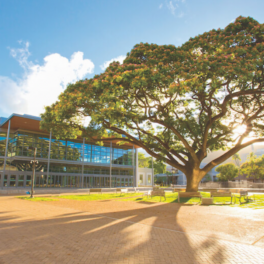Student-adviser pair honored for outstanding marine research, commitment to equity, inclusion
 Reece James (l) and Angel White (r)
Reece James (l) and Angel White (r)University of Hawai‘i (UH) at Mānoa oceanography graduate student Reece James and professor Angelicque White were selected by the Howard Hughes Medical Institute for the Gilliam Fellows Program. They join the cohort of 50 science graduate student-adviser pairs who are recognized for their outstanding research as well as their commitment to advancing equity and inclusion in science. This is the first ever Gilliam Fellow awarded to a UH Mānoa student.
Administered by HHMI’s Center for the Advancement of Science Leadership and Culture (CASLC), the Gilliam Fellows Program will provide each student-adviser pair with $53,000 in support each year for up to three years of the student’s dissertation research.
“Being selected for this program is both validating and inspiring; both a recognition of the work that myself and Dr. White have put forth to further the scientific community, and an opportunity to expand our understanding of how we can contribute to the ongoing advancement of diverse, equitable and inclusive life science research,” said James.
James and White’s research involves using imaging tools that can be deployed from the sea surface and lowered through the depths of the ocean to the seafloor. James’ work with the Hawai‘i Ocean Time-series combines this imaging technology with machine learning algorithms to describe the abundance and diversity of small organisms and microbes in the North Pacific. This research helps to better understand how microbes act to transport carbon and redistribute nutrients throughout the water column on daily, seasonal, and interannual time scales.
Advancing an inclusive graduate school experience
The Gilliam Fellows Program recognizes the importance of mentorship in developing tomorrow’s scientific leaders. Fellows join a vibrant community and are offered leadership training, professional development, and opportunities to engage with and learn from peers, program alumni, and HHMI scientists. Their advisers also join a cohort of peers, participate in HHMI’s intensive, one-year mentorship skills development course, and receive support to promote healthy and inclusive graduate training environments at their home institution.
“This year’s Gilliam Fellows and their advisers are not only working at the cutting edge of scientific discovery, but they’re also forging new pathways for others to do the same,” said Blanton Tolbert, vice president of CASLC. “Their dedication to creating environments in which researchers of all backgrounds can thrive will have an impact on science for generations to come.”
This program will further the diversity, equity and inclusion (DEI) efforts that James and White have been involved in before and during their time at UH Mānoa. James co-authored the article “Navigating Gender at Sea” that details the experiences of transgender and gender diverse oceanographers during sea-going fieldwork and outlines new recommendations for making seagoing fieldwork more inclusive. Further, James has worked to assess the diversity of graduate student departmental demographics, equitable changes to graduate student finances, and create guidelines for accessible presentation of scientific materials. White has served on the Department of Oceanography’s DEI committee; is a faculty search advocate; and has participated in the American Geophysical Union’s Unlearning Racism in the Geosciences program.
“We intend to use the funding from the Howard Hughes Medical Institute fellowship, in part, to bring DEI focused seminar speakers to UH Mānoa, in keeping with the blueprint of a graduate student-led initiative, termed “Unpacking Diversity”, designed to address the experiences of marginalized groups in the atmospheric, earth, and ocean sciences,” said James. “This effort intends to spur conversation regarding social justice in academia, and offer resources to address contemporary issues within the ocean sciences for minority communities.”
“We are particularly excited to engage with the Gilliam community, leadership training, and professional development that is offered through the HHMI fellowship,” said White. “This is a chance to engage with other life scientists who value the diversity and equitability of our fields, receive educational support which prioritizes DEI advancement, and to learn from alumni efforts.”
“Gilliam is more than just a fellowship,” says Joshua Hall, senior program officer for the Gilliam Fellows Program. “All of our new fellows will join a community where they are truly celebrated and supported, not just for their scientific accomplishments, but also for the unique ways each and every one of them makes the science ecosystem a better place. Our current fellows consistently report that the community is the best part of being a Gilliam Fellow.”
All told, the Gilliam Fellows Program received applications from a record-breaking 162 different institutions. With the addition of the 2024 cohort, the Gilliam community now totals 501 scientists, including those who have graduated from the program.



